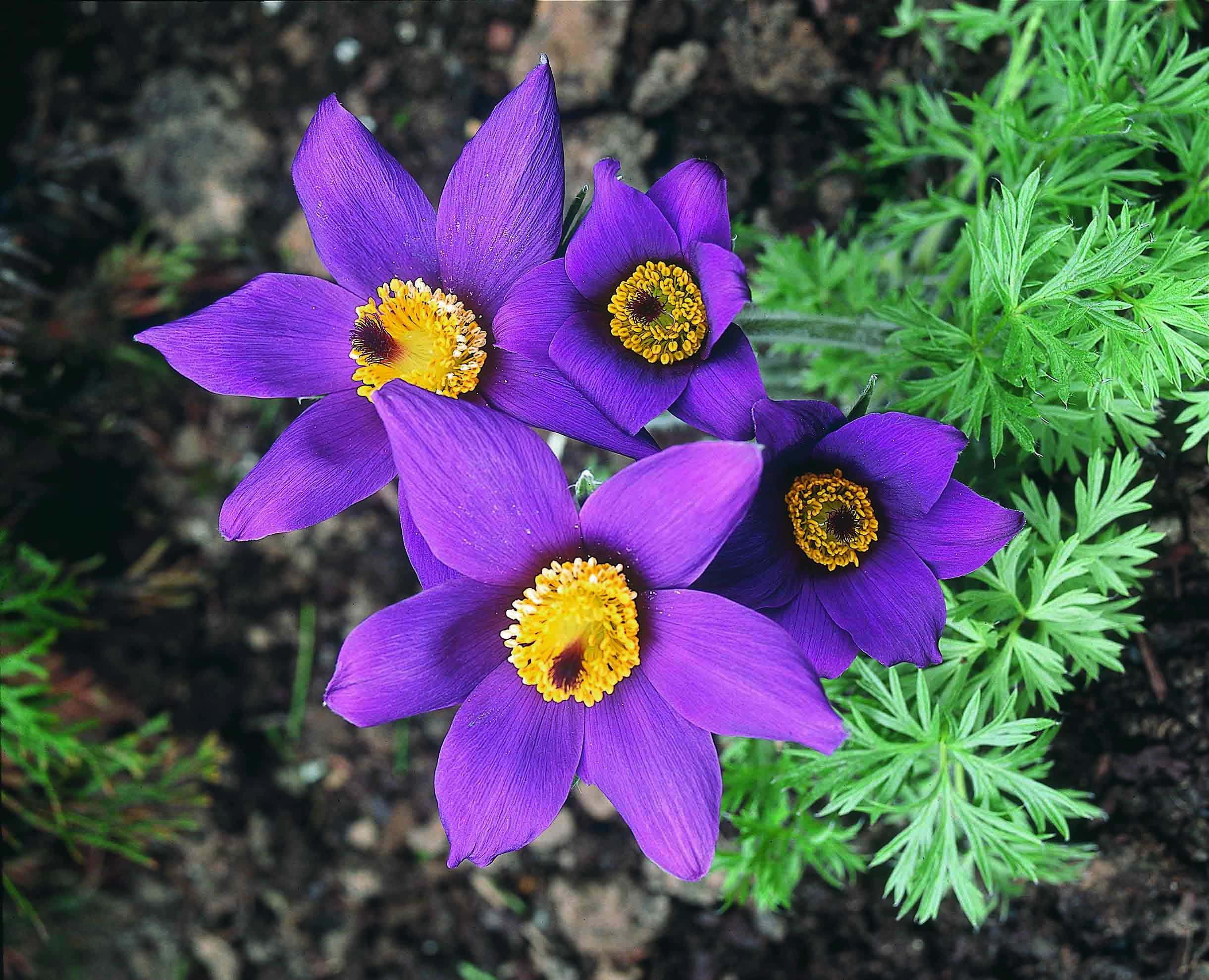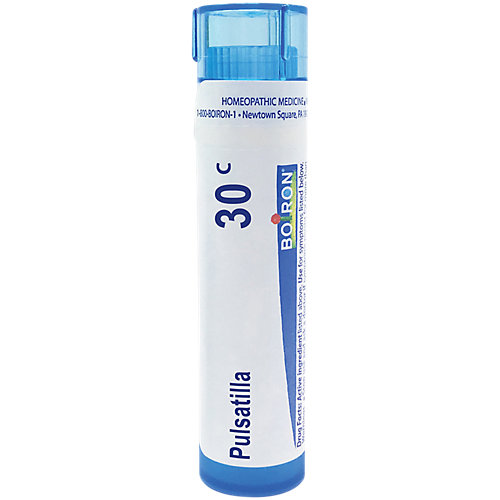Pulsatilla Nigricans
The Homeopathic Remedy Pulsatilla is good for where people have painful indigestion, rumbling gas, bitter belching and heartburn. It can also be used for car and motion sickness, especially if the window must come down to let in fresh air.
For girls and women, Pulsatilla addresses the whole range of hormonal issues from PMS to hot flashes. Its PMS is full of cramps, dull aching pain and milky discharge with back pain before typically late irregular periods. It can be critical to young girls weakened by puberty.
Other uses for pulsatilla are shifting leg pains and swollen joints; sleepiness during the day, and anxious restless dreams at night; eye irritation with thick discharge and inflamed eyelids; ear pain and congestion; and acne in young girls.
Pulsatilla is commonly used for:
Colds and Cough:
Used for the type of cold where the individual feels really sick. They tend to have a blocked nose with very thick and dark mucous that may even show up as a bloody nose. There is often a reduced sense of taste and a very wet type of cough associated with this cold. Pulsatilla works best as a homeopathic remedy where violent coughing episodes are quite common and where the mucous seems to almost overtake the body.
Sinusitis:
Many people turn to pulsatilla when faced with a yellow catarrh and terrible headaches associated with this type of sinusitis. The symptoms include sharp pains on the face with tenderness that may be unbearable. This homeopathic remedy can help when the individual feels watery discharge from the eyes and an inability to breathe properly.
Eye Infections:
This is the type of eye infection where discharge, that is often green in color, is literally oozing from the eye. Pulsatilla may work well as a homeopathic remedy for conjunctivitis and itchy styes specifically, though it can help with any sort of sensitivity or related symptoms.
Women’s Health:
Any type of issues associated with an abnormal or interrupted menstrual cycle or flow can be helped tremendously with the homeopathic remedy of pulsatilla. If there is abnormal or infrequent menstrual cycles, or if there are extreme symptoms such as severe premenstrual symptoms or even mood swings, this homeopathic remedy may be helpful. In addition, pulsatilla helps with morning sickness and other similar and common symptoms of pregnancy which can be difficult to deal with.
Digestive Disorders:
There is always a wide range of symptoms that one may suffer when it comes to digestive disorders. Turning to pulsatilla as a homeopathic remedy may work best for symptoms such as indigestion, nausea, diarrhea, and even itchy or painful hemorrhoids.
Where to buy Pulsatilla
Get Free Shipping on orders over $25 at VitaminShoppe.com!
Pulsatilla’s Personality Profile:
The type of person that benefits the most from using the homeopathic remedy of pulsatilla tends to be very compliant, calm, and good natured. Though they are often fairly calm in their nature, they tend to have frequent mood swings that can come out of nowhere. They like attention and the spotlight, and they frequently crave sympathy when the situation warrants it. Their physical and emotional symptoms may come on quickly and commonly leave just as quickly, often without any warning. They may have a wide range of physical problems, and therefore can benefit from the healing powers of a versatile homeopathic remedy such as pulsatilla.
Pulsatilla’s Materia Medica:
Mind: Weeps easily. Timid, irresolute. Fears in evening to be alone, dark, ghost. Likes sympathy. Children like fuss and caresses. Easily discouraged. Morbid dread of the opposite sex. Religious melancholy. Given to extremes of pleasure and pain. Highly emotional. Mentally, an April day.
Head: Wandering stitches about head; pains extend to face and teeth; vertigo; better in open air. Frontal and supra-orbital pains. Neuralgic pains, commencing in right temporal region, with scalding lachrymation of affected side. Headache from overwork. Pressure on vertex.
Ears: Sensation as if something were being forced outward. Hearing difficult, as if the ear were stuffed. Otorrhœa. Thick, bland discharge; offensive odor. External ear swollen and red. Catarrhal otitis. Otalgia, worse at night. Diminishes acuteness of hearing.
Eyes: Thick, profuse, yellow, bland discharges. Itching and burning in eyes. Profuse lachrymation and secretion of mucus. Lids inflamed, agglutinated. Styes. Veins of fundus oculi greatly enlarged. Ophthalmia neonatorum. Subacute conjunctivitis, with dyspepsia; worse, in warm room.
Nose: Coryza; stoppage of right nostril, pressing pain at root of nose. Loss of smell. Large green fetid scales in nose. Stoppage in evening. Yellow mucus; abundant in morning. Bad smells, as of old catarrh. Nasal bones sore.
Face: Right-sided neuralgia, with profuse lachrymation. Swelling of lower lip, which is cracked in middle. Prosopalgia towards evening till midnight; chilly, with pain.
Mouth: Greasy taste. Dry mouth, without thirst; wants it washed frequently. Frequently licks the dry lips. Crack in middle of lower lip. Yellow or white tongue, covered with a tenacious mucus. Toothache; relieved by holding cold water in mouth (Coff). Offensive odor from mouth (Merc; Aur). Food, especially bread, tastes bitter. Much sweet saliva. Alternations of taste, bitter, bilious, greasy, salty, foul. Loss of taste. Desire for tonics.
Stomach: Averse to fat food, warm food, and drink. Eructations; taste of food remains a long time; after ices, fruits, pasty. Bitter taste, diminished taste of all food. Pain as from subcutaneous ulceration. Flatulence. Dislikes butter (Sang). Heartburn. Dyspepsia, with great tightness after a meal; must loosen clothing. Thirstlessness, with nearly all complaints. Vomiting of food eaten long before. Pain in stomach an hour after eating (Nux). Weight as from a stone, especially in morning on awakening. Gnawing, hungry feeling (Abies c). Perceptible pulsation in pit of stomach (Asaf). All-gone sensation, especially in tea drinkers. Waterbrash, with foul taste in the morning.
Abdomen: Painful, distended; loud rumbling. Pressure as from a stone. Colic, with chilliness in evening.
Stool: Rumbling, watery; worse, night No two stools alike. After fruit (Ars; Chin). Blind hæmorrhoids, with itching and sticking pains. Dysentery; mucus and blood, with chilliness (Merc; Rheum). Two or three normal stools daily.
Urine: Increased desire; worse when lying down. Burning in orifice of urethra during and after micturition. Involuntary micturition at night, while coughing or passing flatus. After urinating, spasmodic pain in bladder.
Female: Amenorrhœa (Cimicif; Senec; Polygon). Suppressed menses from wet feet, nervous debility, or chlorosis. Tardy menses. Too late, scanty, thick, dark, clotted, changeable, intermittent. Chilliness, nausea, downward pressure, painful, flow intermits. Leucorrhœa acrid, burning, creamy. Pain in back; tired feeling. Diarrhœa during or after menses.
Male: Orchitis; pain from abdomen to testicles. Thick, yellow discharge from urethra; late stage of gonorrhœa. Stricture; urine passed only in drops, and stream interrupted (Clemat). Acute prostatitis. Pain and tenesmus in urinating, worse lying on back.
Respiratory: Capricious hoarseness; comes and goes. Dry cough in evening and at night; must sit up in bed to get relief; and loose cough in the morning, with copious mucous expectoration. Pressure upon the chest and soreness. Great soreness of epigastrium. Urine emitted with cough (Caust). Pain as from ulcer in middle of chest. Expectoration bland, thick, bitter, greenish. Short breath, anxiety, and palpitation when lying on left side (Phos). Smothering sensation on lying down.
Sleep: Wide awake in the evening; first sleep restless. Wakes languid, unrefreshed. Irresistible sleepiness in afternoon. Sleeps with hands over head.
Back: Shooting pain in the nape and back, between shoulders; in sacrum after sitting.
Extremities: Drawing, tensive pain in thighs and legs, with restlessness, sleeplessness and chilliness. Pain in limbs, shifting rapidly; tensive pain, letting up with a snap. Numbness around elbow. Hip-joint painful. Knees swollen, with tearing, drawing pains. Boring pain in heels toward evening; suffering worse from letting the affected limb hang down (Vipera). Veins in forearms and hands swollen. Feet red, inflamed, swollen. Legs feel heavy and weary.
Skin: Urticaria, after rich food, with diarrhœa, from delayed menses, worse undressing. Measles. Acne at puberty. Varicose veins.
Fever: Chilliness, even in warm room, without thirst. Chilly with pains, in spots, worse evening. Chill about 4 pm. Intolerable burning heat at night, with distended veins; heat in parts of body, coldness in other. One-sided sweat; pains during sweat. External heat is intolerable, veins are distended. During apyrexia, headache, diarrhœa, loss of appetite, nausea.
Modalities: Worse, from heat, rich fat food, after eating, towards evening, warm room, lying on left or on painless side when allowing feet to hang down. Better, open air, motion, cold applications, cold food and drinks, though not thirsty.



